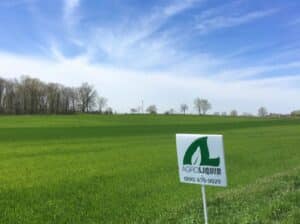
People are always searching for the next, better, and best crop nutrition strategies.
While it’s easy to be inspired by the successes of neighboring farms, the reality is that what works for one farm may not necessarily work for another. Variations in soil types, climate, and management practices can affect any approach.
On-farm trials
On-farm trials let farmers fine-tune crop nutrition plans and make sure strategies are tailored to a farm’s unique conditions. Stephanie Zelinko, AgroLiquid national agronomist, emphasizes the importance of testing practices directly on your farm.
“Just because something is working for someone else doesn’t mean it will automatically work for you,” Zelinko said. “On-farm trials allow you to gather data specific to your operation and make informed decisions.”
Zelinko highlighted the impact of historical management practices on soil health and crop performance. She shared the story of a Michigan grower who purchased neighboring, contiguous land, only to discover dramatic variations in soil test levels compared to his existing fields.
“That taught us pretty easily that when you know how fields are managed historically, it can have a big effect on how they’re going to perform currently,” she said. “So again, you don’t know those management practices exactly of all your neighbors, and if you don’t know what they’re doing, it’s really hard to make that assumption that if they’re seeing success in something that it’s going to work for you.”
This underlines the need for on-farm testing, even when dealing with nearby and seemingly similar plots of land.
Arkansas farmer and member of XtremeAg Layne Miles agreed.
“You like to try to make sure you look as good as your neighbor,” he said. “You can’t be afraid to go ask and say hey, what did you do to this crop to make it look like this, versus how I look. Don’t be afraid to ask questions. My dad always taught me, if there’s something you don’t know, don’t be afraid to ask.”
A solid foundation
Before beginning on any on-farm trials, it’s helpful to establish a baseline understanding of your soil’s nutrient profile. Zelinko recommends conducting a comprehensive soil test within the past two to three years to guide crop nutrition decisions.
“The soil test is going to give you a good idea of what’s in your soil, what you may need, and then how your crop’s going to perform based on those applications,” she said.
Miles also advocated for on-farm trials. He stressed that every farm is different and emphasized the value of experimentation. Miles advised conducting trials on smaller acreages, around 20-40 acres, to make sure there is accurate data collection.
While yield is often the primary focus, the ultimate goal is to maximize profitability. Zelinko pointed out that fertilizer is a significant portion of a farm’s budget. On-farm trials allow growers to evaluate the ROI for specific practices and products, which helps growers make better financial decisions.
“Obviously for a farmer, if it’s economical, and we’re always looking for that ROI,” he said. “Your goal is to always gain bushels or to be able to make the land more productive. So the only way to do that is trying different things, researching different things, knowing what you spend on it…and the only way to know that is to research it.”
Zelinko grew up on a farm that did seed research, and she also worked in research for 18 years. Plus, she and her husband also farm.
“By taking that and translating it back to your farm, your own research, that just gives you another data point to go off of and one that may be a little bit more accurate for your exact situation,” she said.
Plus, by combining yield maps with soil tests, tissue samples, and other data, growers can have an even better understanding of their fields.
Overall:
On-farm trials give you the detail you need. What works on a neighboring farm may not work on yours, so conduct trials to get data specific to your farm.
Get a baseline and focus on ROI. Start with a soil test to understand your nutrient profile. When selecting treatments, make ROI and profitability your top priority, not just yield increases.
Combine multiple data sources for a complete picture. Integrate yield maps, test, and trial results to make the best decisions.
AgroLiquid
AgroLiquid has been plant nutrition products for over 40 years. At our North Central Research Station (NCRS), where we have over 1400 tillable acres, annual testing includes multiple replicated treatments to a wide range of row crops, including alfalfa, corn, dry beans, sorghum, soybeans, sugarbeets, wheat, and more. The NCRS also contracts and facilitates research across the country in soils and crops not native to our region. No other liquid fertilizer manufacturer is more dedicated to research and applied technology.
In addition, our experts are always willing to help you with your nutrition plans. Contact us anytime.
For more information, watch our video Data That Works For You.

